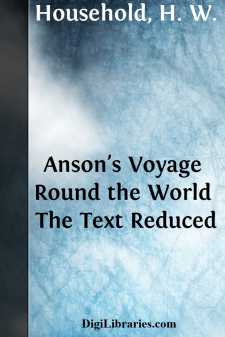Categories
- Antiques & Collectibles 13
- Architecture 36
- Art 48
- Bibles 22
- Biography & Autobiography 813
- Body, Mind & Spirit 142
- Business & Economics 28
- Children's Books 16
- Children's Fiction 13
- Computers 4
- Cooking 94
- Crafts & Hobbies 4
- Drama 346
- Education 46
- Family & Relationships 57
- Fiction 11829
- Games 19
- Gardening 17
- Health & Fitness 34
- History 1377
- House & Home 1
- Humor 147
- Juvenile Fiction 1873
- Juvenile Nonfiction 202
- Language Arts & Disciplines 88
- Law 16
- Literary Collections 686
- Literary Criticism 179
- Mathematics 13
- Medical 41
- Music 40
- Nature 179
- Non-Classifiable 1768
- Performing Arts 7
- Periodicals 1453
- Philosophy 64
- Photography 2
- Poetry 896
- Political Science 203
- Psychology 42
- Reference 154
- Religion 513
- Science 126
- Self-Help 84
- Social Science 81
- Sports & Recreation 34
- Study Aids 3
- Technology & Engineering 59
- Transportation 23
- Travel 463
- True Crime 29
Anson's Voyage Round the World The Text Reduced
by: H. W. Household
Categories:
Description:
Excerpt
INTRODUCTION.
It was in the reign of Elizabeth that England first became the enemy of Spain. Rivals as yet Spain had none, whether in Europe or beyond the seas. There was only one great mmilitary monarchy in Europe, only one great colonising power in the New World, and that was Spain. While England was still slowly recovering from the prostration consequent upon the Wars of the Roses, and nearly a century had to run before she established her earliest colony in Newfoundland, the enterprise and disciplined courage of the Spaniards had added an enormous empire across the Atlantic to the already great dominions of the Spanish crown. In 1520 Magellan, whose ship was the first to circumnavigate the globe, pushed his way into the Pacific and reached the Philippines. In 1521 Cortez completed the conquest of Mexico. Pizarro in 1532 added Peru, and shortly afterwards Chile to the Spanish Empire.
From the gold mines of Chile and the silver mines of Peru a wealth of bullion hitherto undreamed of poured into the treasuries of Spain. But no treasuries, however full, could meet the demands of Phillip II. His fanatical ambition had thought to dominate Europe and root out the newly reformed religion which had already established itself in the greater part of the north and west, and nowhere more firmly than among his subjects in the Netherlands and among the English. England for years he had seemed to hold in the hollow of his hand. The Dutch, at the beginning of their great struggle for freedom, appeared even to themselves to be embarking upon a hopeless task. Yet from their desperate struggle England and Holland rose up two mighty nations full of genius for commerce and for war, while Spain had already advanced far along that path of decline which led rapidly to the extinction of her preeminence in Europe and the loss of her colonies beyond the seas.
By the daring genius of Drake and the great English seamen of the age of Elizabeth the field of operations was transferred from the Channel to the American coast. The sack of Spanish towns and the spoil of treasure ships enriched the adventurers, whose methods were closely akin to piracy, and who rarely paused to ask whether the two countries were formally at war. "No peace beyond the line" was a rule of action that scarcely served to cloak successful piracy. In Spanish eyes it was, not without reason, wholly unjustifiable.
The colonial policy of Spain was calculated to raise up everywhere a host of enemies. In her mistaken anxiety to keep all the wealth of her colonies to herself she prohibited the rest of the world from engaging in trade with them. Only with her might they buy and sell. The result was that a great smuggling trade sprang up. No watchfulness could defeat the daring and ingenuity of the English, Dutch, and French sailors who frequented the Caribbean Sea. No threats could prevent the colonists from attempting to buy and sell in the market that paid them best. The ferocious vengeance of the Spaniards, which in some cases almost exterminated the population of their own colonies, converted the traders into the Buccaneers, an association of sailors of all nations who established themselves in one of the islands of the Caribbean Sea, and who for three-quarters of a century were the scourge of the Spanish trade and dominions....


